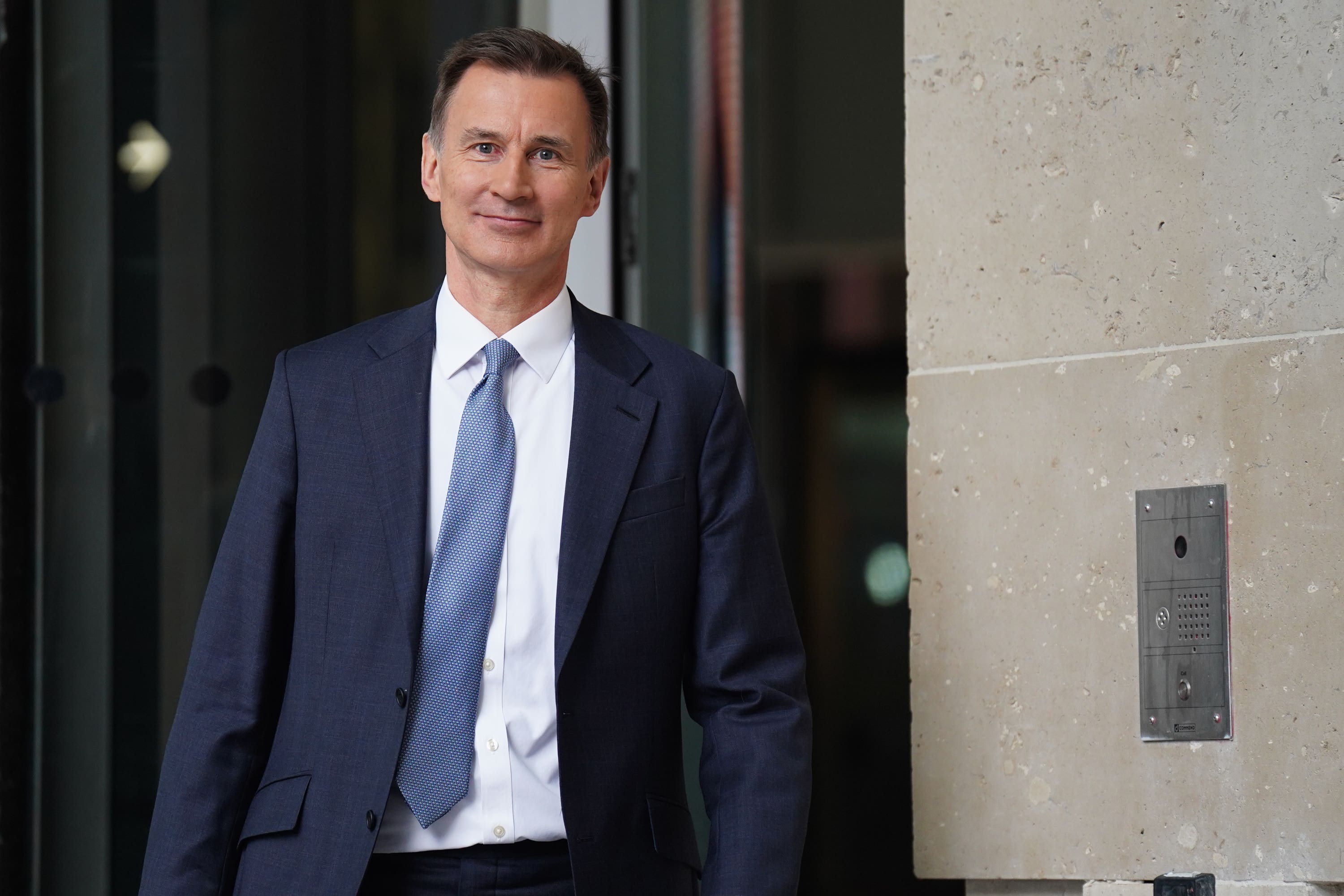Hunt warns against fuelling inflation but hints at tax cuts for businesses
The Chancellor seemed to downplay speculation that income tax could be reduced in his autumn statement on Wednesday.

Jeremy Hunt has heightened expectations that he will cut taxes on businesses in a bid to boost growth with his autumn statement but downplayed chances of reducing income tax.
The Chancellor persistently warned against changes that could fuel inflation, dampening speculation that income tax or national insurance could be reduced.
He suggested during a round of broadcast interviews ahead of Wednesday’s financial package that the personal tax burden will not come down “overnight” as he seeks to avoid prices spiralling again.
Mr Hunt made clear that his “priority is backing British business” after promising an “autumn statement for growth”.
Rachel Reeves, his Labour shadow, warned cutting inheritance tax during a cost-of-living crisis would be wrong amid some Tory unease over the possible move.
She also warned against the “gradual erosion of people’s incomes” if Mr Hunt goes ahead and squeezes billions from benefits payments, as has been under consideration.
Mr Hunt declared he wants to “bring down our tax burden” as he presented a positive tone after a year of urging restraint while battling to halve the rate of inflation.
“I think it’s important for a productive, dynamic, fizzing economy that you motivate people to do the work, to take the risks that we need,” he told Sky’s Sunday Morning with Trevor Phillips.
I want to show people there's a path to lower taxes. But we also want to be honest with people, this is not going to happen overnight
He did not rule out any specific changes, including most controversially to inheritance tax, saying “everything is on the table in an autumn statement”.
He stressed that “lower tax is essential to economic growth”.
The Chancellor made clear to Times Radio that his “priority is backing British business” and changes that “unlock growth”.
Pressed if the high pressure of income tax could be eased, he stressed the need to act “in a responsible way”.
“I want to show people there’s a path to lower taxes. But we also want to be honest with people, this is not going to happen overnight,” he said. “It requires enormous discipline year in, year out.”
Mr Hunt said he will not take any actions that would “jeopardise” the fight against inflation, which is higher than wanted at 4.6%, though it has halved in the last year.
“The one thing we won’t do is any kind of tax cut that fuels inflation. We’ve done all this hard work, we’re not going to throw that away,” he told Sky, dampening hopes of cuts to income tax or national insurance.
The Sunday Times had reported Mr Hunt and Prime Minister Rishi Sunak are weighing up cuts to income tax or national insurance in a last-minute move to boost growth and their favour with voters.
Ms Reeves told the BBC’s Sunday with Laura Kuenssberg: “Cutting inheritance tax in the middle of a massive cost-of-living crisis and when public services are on their knees is not the right priority.
“I understand people’s desire to pass onto their children what they have worked hard for, but right now that is not the right thing to do and we would not support it.”
The shadow chancellor also rejected Mr Hunt’s argument that he needs to take “difficult decisions” on welfare payments.
Typically, ministers use the September figure for inflation when uprating working-age benefits, which would mean a 6.7% hike.
However, the Chancellor has been considering using October’s far lower figure of 4.6%, which economists say would cut spending by around £3 billion.
The savings would largely affect working-age households receiving disability or means-tested benefits, according to the Institute for Fiscal Studies.
Ms Reeves said benefits should rise by the higher figure, adding: “If you pick and choose from year to year which inflation number is the cheapest thing to do, then what you see is the gradual erosion of people’s incomes.”
Slashing inheritance tax – potentially by half – would be popular with the Tory right as Mr Sunak comes under growing pressure from that wing of his party, but would only directly benefit a small proportion of the public.
Only about 4% of deaths in 2020/21 resulted in inheritance tax being paid, with exemptions allowing many couples to pass on up to £1 million tax-free.
Inheritance tax is charged at 40% on estates of more than £325,000, with an extra £175,000 towards a main residence passed to direct descendants.
The Conservatives are said to be considering cutting it in half before a potential promise to abolish it entirely in the next Tory manifesto, which could cost £7 billion a year in the short term.
However, the Institute for Fiscal Studies forecast that the amount that the tax raises could rise to more than £15 billion by 2033.
Subscribe to Independent Premium to bookmark this article
Want to bookmark your favourite articles and stories to read or reference later? Start your Independent Premium subscription today.
